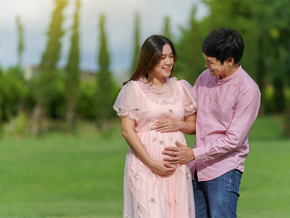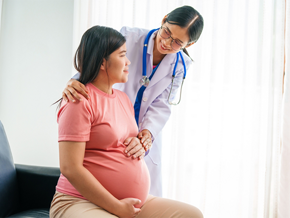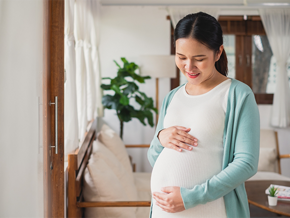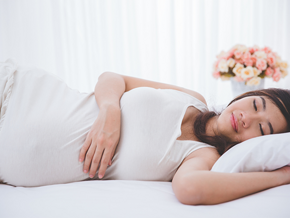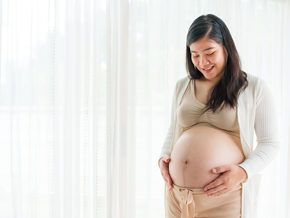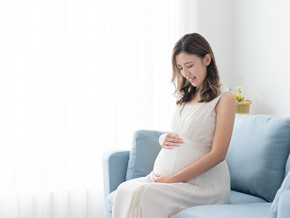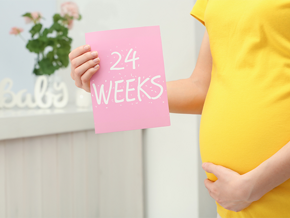
If you're sexually active and you notice that you're feeling a bit different, you might be wondering if you might be pregnant. Have you been feeling the early signs of pregnancy, such as nausea, sleepiness or sensitive breasts? Scroll down to the article to see if it's time to take a pregnancy test and book that doctor’s appointment.
Classic Pregnancy Symptoms
It's good when you notice that something feels different. It means you're tuned in to what your body tells you, especially if you’re trying for a baby. Below are some common early signs to watch for, but remember that every woman experiences pregnancy differently. Some of these signs can also show up right before your period, so you don't automatically jump to thinking, "Am I pregnant?" unless you’ve actively trying.
Missed your period?
Missing your period is the first trigger to your pregnancy alarm bells. A missed period due to pregnancy happens because your body produces hormones that stop ovulation once conception starts.
Missing your period, however, doesn’t necessarily mean you might be expecting. It could happen if you are stressed or facing other health issues.
Feeling nauseated?
Around the fourth to sixth week of pregnancy, you might notice morning nausea, which may or may not be accompanied by vomiting. For some women, this can kick in even earlier, while others might not experience it at all. Although it’s often labeled as "morning sickness," this feeling can strike any time throughout the day.
Do your breasts feel extra tender?
Apart from a missed period, breast tenderness is one of the most pronounced signs of pregnancy. Due to hormonal changes, your breasts feel tender, swollen, sore, and sensitive. You may also observe that the nipple area grows darker.
Can't keep your eyes open?
The sudden urge to nap all the time may be a sign that you're expecting. It's unclear what causes sleepiness, the rise in hormone progesterone levels may contribute to fatigue early in pregnancy.
Running to the bathroom more frequently?
If you're peeing more often than usual, especially without drinking a ton of extra fluids, that could be another early sign of pregnancy. Frequent urination can happen because of hormonal shifts, more blood in your system, and your kidneys getting busy filtering all that extra fluid. These changes usually occur a few weeks after you conceive.
Other Potential Early Signs of Pregnancy

Some women get food cravings in their first trimester.
It's rare for pregnancy symptoms to show in Week 1. During this period, your egg meets your partner's sperm to become a single cell called the zygote. When the zygote divides into cells and forms a cluster of 100, it implants into the uterine lining. At this point, you might start noticing more pregnancy symptoms.
However, as you'll note below, it's easy to miss these as early signs of pregnancy because they're like pre-menstrual symptoms.
Spotting
You might see a light bleed but not quite a period and what wonder what's going on. This spotting could be implantation bleeding, which can happen when the fertilized egg attaches to the uterus lining. This pregnancy symptom may show as early as Week 3 after conception.
Just note that you can also mistake spotting for light menstruation, especially if you don't have regular periods. If the bleeding continues or feels unusual for you, consult your doctor because it may be due to other underlying conditions.
Cramping or bloating
Cramping early in pregnancy can feel a lot like the mild cramps you get before your period. It usually happens around the time you experience spotting. On top of that, hormonal shifts and a slower digestive system might leave you feeling bloated. If your jeans feel a little tighter than usual, even without any big meals, you may be looking at an early sign of pregnancy.
Food cravings or aversions
Don't be surprised if your taste buds go through a complete makeover. Those pregnancy hormones can make you crave things you never liked before or turn you off from your favorites. Maybe that alamang you used to enjoy now makes you gag, or you find yourself reaching for green mangoes at midnight. Pregnancy cravings or paglilihi is all part of the hormonal roller coaster.
Mood swings
You're not alone if you tear up watching a random YouTube commercial or snap at someone over something minor. Mood swings are common in early pregnancy, thanks again to all the hormonal shifts in your body. Be gentle with yourself because your emotions are adjusting right along with everything else.
Rise in body temperature
If you've been tracking your basal body temperature (BBT), you might notice it stays higher than usual. Pregnancy hormones, especially progesterone, keep your temperature up after ovulation. While the difference might seem small (from around 36.1°C to about 37.2°C), it can be one of those subtle signs your body gives you before you even take a pregnancy test.
Here are other early signs of pregnancy you could feel during a pregnancy's first trimester.
- Constipation
- Headaches
- Dizziness
- Backaches
- Heartburn
When Can You Become Pregnant

Tracking your menstrual cycle is helpful if you're trying to conceive.
Knowing your fertile window and ovulation days can make a big difference when you're trying to spot those early signs of pregnancy. (Using an ovulation calendar can really help!) The more in tune you are with your ovulation and menstrual cycle, the easier it is to notice when something feels different, especially if you're actively trying to conceive.
Here's a simple timeline of what you might expect after ovulation and intercourse.
2 weeks before your period
Ovulation occurs on Day 14 after your last period in a typical 28-day cycle, although this can vary even if you have regular menstruation. Having unprotected sex during your fertile window—five days before ovulation, on the day of ovulation and the day following—can potentially lead to pregnancy.
24 hours after intercourse
Conception starts with the union of your egg and your partner's sperm. This fertilization can happen in just a few minutes or up to 24 hours after unprotected sex. It's highly unlikely for you to feel pregnancy symptoms in the first 72 hours after your egg becomes fertilized.
8 to 14 days after intercourse
Your fertilized egg attaches to the lining of the uterus, and a placenta begins to form. Once the placenta forms, it releases human chorionic gonadotropin (hCG) or the pregnancy hormone. Your hCG levels will continue to rise in the first two to three months of pregnancy
When to Get a Pregnancy Test
The most accessible way to confirm if you're pregnant, especially after a missed period, is to get a pregnancy test, but you don't want to do it early.
Home pregnancy tests are designed to detect the presence of hCG, and urine-based pregnancy tests produce more accurate readings. The maximum days to confirm your pregnancy with a pregnancy test is one to two weeks after a missed period or 21 days after intercourse if you're unsure of your cycle.
Do the pregnancy test in the morning when your urine is most concentrated. Follow the kit instructions; home pregnancy tests can be 99% when done correctly.
If you tested positive on your home pregnancy test, confirm your pregnancy with a follow-up checkup with your ob-gyn, who can start you early on a prenatal care plan. The World Health Organization (WHO) recommends scheduling your first prenatal visit within the first 12 weeks of pregnancy.
Remember, your pregnancy symptoms may look different from someone else’s. Having a healthcare provider you feel comfortable with can make all the difference. They can guide you with the right advice and help you care for yourself through every stage of this incredible journey!
What early signs of pregnancy did you experience? Share them with fellow moms at ParenTeam's Facebook group!
References
“Pregnancy Test.” n.d. https://medlineplus.gov/lab-tests/pregnancy-test/.
“10 Early Signs of Pregnancy.” 2025. Johns Hopkins Medicine. March 19, 2025. https://www.hopkinsmedicine.org/health/wellness-and-prevention/10-early-signs-of-pregnancy.
“What Is the Temperature Method? | Basal Body Temperature.” n.d. Planned Parenthood. https://www.plannedparenthood.org/learn/birth-control/fertility-awareness/whats-temperature-method-fams.















